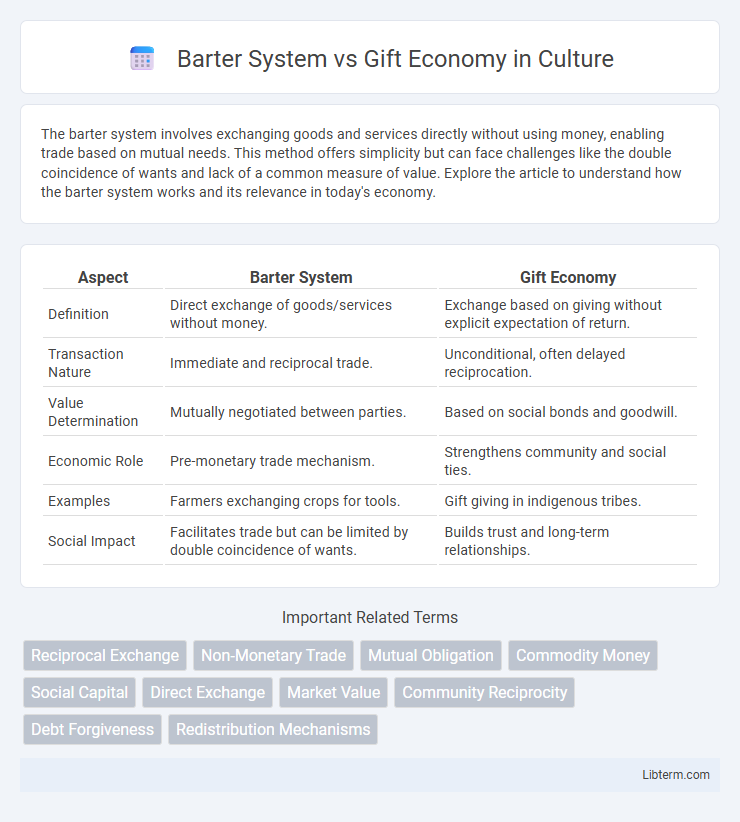The barter system involves exchanging goods and services directly without using money, enabling trade based on mutual needs. This method offers simplicity but can face challenges like the double coincidence of wants and lack of a common measure of value. Explore the article to understand how the barter system works and its relevance in today's economy.
Table of Comparison
| Aspect | Barter System | Gift Economy |
|---|---|---|
| Definition | Direct exchange of goods/services without money. | Exchange based on giving without explicit expectation of return. |
| Transaction Nature | Immediate and reciprocal trade. | Unconditional, often delayed reciprocation. |
| Value Determination | Mutually negotiated between parties. | Based on social bonds and goodwill. |
| Economic Role | Pre-monetary trade mechanism. | Strengthens community and social ties. |
| Examples | Farmers exchanging crops for tools. | Gift giving in indigenous tribes. |
| Social Impact | Facilitates trade but can be limited by double coincidence of wants. | Builds trust and long-term relationships. |
Understanding the Barter System
The barter system involves the direct exchange of goods and services without using money, relying on a double coincidence of wants where both parties must have what the other desires. It was an early economic practice facilitating trade in pre-monetary societies and hinges on mutual agreement regarding the relative value of exchanged items. Unlike the gift economy, which emphasizes social bonds and reciprocity without immediate or equivalent returns, the barter system operates on negotiated transactions to fulfill specific, immediate needs.
Defining the Gift Economy
The gift economy is a socio-economic system where goods and services are given without explicit agreements for immediate or future rewards, promoting social bonds and communal trust. Unlike the barter system, which involves direct exchange of comparable goods or services based on mutual agreement, the gift economy emphasizes altruism and reciprocity within a community. Anthropological studies highlight that gift economies foster sustained relationships and social cohesion rather than transactional value equivalence.
Historical Origins of Barter and Gift Economies
Barter systems trace back to prehistoric times when early humans exchanged goods and services directly to meet immediate needs, predating the invention of money and complex trade networks. Gift economies originated in tribal societies where reciprocal exchange of goods and favors fostered social bonds and communal trust, emphasizing relationships over immediate economic gain. Archaeological evidence from ancient Mesopotamia and indigenous cultures highlights how both systems laid foundational roles in economic development before formal market structures emerged.
Core Principles: Exchange vs. Reciprocity
The barter system operates on the core principle of direct exchange, where goods or services are traded between parties based on mutual agreement without a standard medium of value. In contrast, the gift economy emphasizes reciprocity, where items are given without an explicit agreement for immediate return, fostering social bonds and community trust. Understanding these fundamental differences highlights how barter relies on transactional equivalence while gift economies build long-term social capital through unconditional generosity.
Social Dynamics and Relationships
The barter system fosters reciprocal exchange based on immediate needs, often requiring negotiation and establishing direct social contracts between participants, which can create transactional relationships. In contrast, a gift economy emphasizes generosity and social bonds, where gifts are given without explicit expectations of return, strengthening communal ties and trust among its members. These differing social dynamics influence how communities develop trust, cooperation, and long-term social cohesion.
Advantages of the Barter System
The barter system facilitates direct exchange of goods and services without the need for money, enabling immediate transactions based on mutual needs. It promotes resource efficiency by allowing individuals to trade surplus items, reducing waste and encouraging local economic activity. This system also helps build trust and social bonds within communities through personal interactions and negotiated agreements.
Benefits of a Gift Economy
A gift economy fosters strong social bonds by encouraging generosity and reciprocal relationships, enhancing community cohesion and trust. Unlike the barter system, which relies on direct exchange and requires a coincidence of wants, a gift economy allows for more flexibility and long-term social investment without immediate reciprocation. This system promotes resource sharing and reduces transactional costs, leading to sustainable cooperation within societies.
Challenges and Limitations of Each System
Barter systems face challenges such as the double coincidence of wants, where both parties must have mutually desired goods or services, limiting transaction efficiency and scope. Gift economies encounter limitations in scalability and sustainability, as trust and social bonds are essential, but may weaken in larger or less cohesive communities, leading to imbalances in reciprocity. Both systems struggle with valuation complexities, as bartering requires precise exchange rates while gift economies rely heavily on subjective social norms.
Modern Examples and Applications
The barter system persists in modern trade zones, such as local farmer's markets where goods and services exchange without currency, illustrating its ongoing practical application. In contrast, the gift economy thrives in online communities like open-source software development and crowdfunding platforms, where contributions are motivated by reputation and altruism rather than direct compensation. Both systems challenge traditional monetary transactions by emphasizing trust, reciprocity, and social bonds in contemporary economic interactions.
Future Perspectives: Evolution of Exchange Systems
The future of exchange systems is likely to witness a hybridization of barter systems and gift economies, enhanced by blockchain technology and digital platforms that enable trustless peer-to-peer transactions and value sharing. Decentralized networks could facilitate more efficient barter exchanges by matching needs in real-time, while gift economies might evolve through social tokens and reputation-based incentives that foster communal collaboration and resource distribution. Advances in AI-driven marketplaces are expected to optimize these models, creating dynamic, adaptive frameworks for exchanging goods and services beyond traditional monetary systems.
Barter System Infographic

 libterm.com
libterm.com